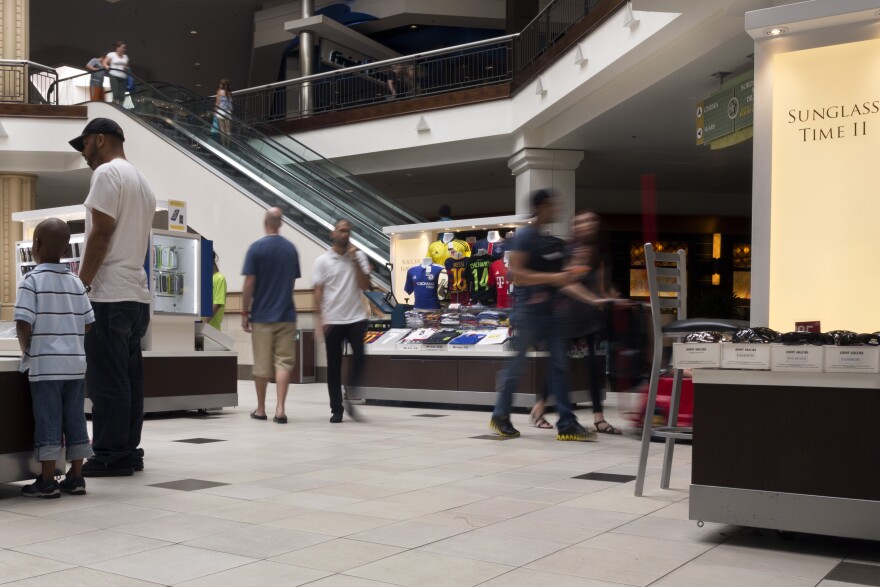In some U.S. cities, shopping malls are a thing of the past. For the malls that are surviving, about one-fifth have vacancy rates that experts consider "troubling.”
Austin's own Highland Mall went that way: It recently closed and was converted into a community college campus. But what about the city's other big indoor mall?
At Barton Creek Mall, where the women’s apparel store Cachè once stood, a boarded up store sits empty. A jewelry store will move in next month to take over the space, but that's not the only boarded up former shop in the mall. A few other stores sit empty as well.
There are announcements that new shops will fill their spaces — but what would happen if one or two of the mall's big anchor stores were to close?
Barton Creek Square Mall belongs to Simon Properties, who declined to do a taped interview for this story but did answer questions in writing.

An investor-geared promotional video highlights the company’s 110 malls, 14 mills and 68 outlets that sell more than 3,000 brands and pull in revenues of $60 billion. Simon, the video touts, is the No. 1 publicly traded real estate company in the world. The company makes money from the rent it charges to its tenants. So, Simon Properties' profits and the overall health of Barton Creek mall are two different things.
Florida-based attorney Chuck Tatelbaum, who specializes in corporate bankruptcies, says two of Barton Creek's anchor stores are struggling.
“Sears is in trouble, JC Penney hasn't been doing tremendously well,” Tatelbaum says.
A Sears bankruptcy would come to no surprise to some experts. In June, Sears released its first-quarter earnings. The company lost more than $300 million during that period.
However, that loss was touted as a success. During the same quarter the year before, the company lost about $100 million more.
“If Sears were to close at Barton Creek, that would leave a big vacancy, which causes the landlord a problem, which causes the rest of the tenants problems, because there is less traffic,” Tatelbaum says.
Both Sears and JC Penney are massive spaces, and it would take a creative approach to fill them. One way to do it would be to go after high-end anchors. Malls that have gone that route are in much better health than those who cater to the middle- and lower-income shoppers. That could solve things in the near future, but what about the long term?
“The traditional mall as we know it, as shopping, people don't want to go to it,” Tatelbaum says. “Number one, they can shop online and have it delivered for free without leaving their house and, secondly, they want an experience. The concept of going to the mall has changed.”
If Barton Creek Mall were to be repurposed in the future, it would be important to take into account the environment for a couple of reasons. One, building regulations have changed in the 35 years since Barton Creek Mall was built. Additionally, the mall sits on one of Austin's more environmentally sensitive areas.
Chuck Lesniak, the City of Austin's Environmental Officer, says future development is possible and that there likely wouldn’t be built-in environmental restrictions.
“These properties can develop,” Lesniak says. “They usually don't have any quality of water protection [like] having storm water treatment for water quality. So they are creating an environmental impact today.”
The impervious cover at Barton Creek Mall is more than 1.5 million square feet of concrete. Lesniak says almost any type of redevelopment would be better for the environment.

“We want to incentivize redeveloping those properties in a way that allows them to have more economic impact for the city, but also reduces the environmental impact of the existing development,” Lesniak says. “And that’s a struggle and a balance that we deal with a lot. But, Barton Creek Mall is a property that's probably right for that.”
At the moment, neither the City of Austin nor Simon Properties are planning what could be next for Barton Creek Square Mall.
The company's numbers from 2013 show that only one percent of the mall’s stores were vacant and that since then, most have quickly been filled. The challenge will come if the mall’s big anchor stores go under.



